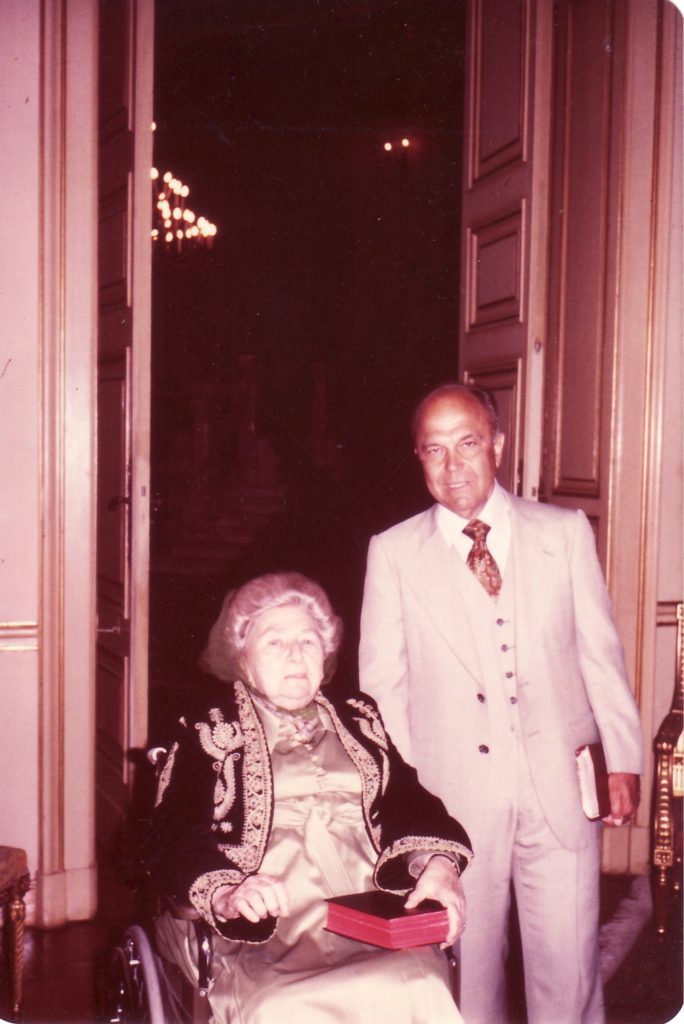
Iran: Meeting with the Shah
An understanding of God’s promise to the offspring of Hagar and her seed, and the prayers for the Arab people, led slowly but directly to Hannah’s visit in January 1980 to President Sadat (and separately with Mrs. Sadat at one of her offices) in Egypt as well as her hour-long visit with the terminally ill former Shah of Iran, to whom she presented a Bible in the Persian language, received with tears.
Iran: Meeting with the Shah
A burden is not something one takes upon oneself; it is given of the Lord and is borne as a consequence of His action in imparting it. If it is borne faithfully, it will ultimately and surely bear fruit. Yet the way to that result may be impeded and very difficult.
So let me go back a while. A friend of mine, a man of prominent social standing, had attended the celebration in Iran of the 2,500th anniversary of the founding of the Persian empire (by Cyrus the Great). He told me of it and showed me a picture of himself with the Shah of Iran, Reza Pahlavi. That was in 1971.
Late in 1978, while I was working in Bogotá, stories began filtering through of rising troubles for the Shah. The Lord moved me then to pray for him, and I continued to do so through the crisis, the deposing of the Shah, and the taking of power by the Ayatollah Khoumeini. The Shah, as you know, took his flight first to Egypt, then to Morocco and Bermuda, and Mexico, then to New York, to Texas, to Panama – and later again to Cairo. The burden did not subside, but remained. I believed that I was to meet the Shah and to minister to him and his family, but, oh, how remote and distant that possibility seemed to become.
Well, if “quickly” had meant any sooner than the end of May (after my April spinal operation), I don’t think that I could have made it, but, as you know there we were in Cairo, Egypt, on June 3rd, rejoicing with Harald that my prayer burden was finding fulfillment: we were to see the Shah at the magnificent Kubbeh Palace the very next evening.
Alone of the leaders of the world, Sadat had offered the exiled Shah a place of welcome, taking a clear stand from the beginning and never wavering in his readiness to put it into effect. When all other doors shut in his face, and Panama seemed ready to accede to Iran’s demand for extradition, it was to Egypt that the ailing Shah had made his way to a warm welcome by President Sadat and the Egyptian people. They placed the large palace that King Farouk once called home at his entire disposal. It was clear that President Sadat’s concern was not political, but personal.
So it was with President Sadat’s blessing, that we rode through the busy streets of Cairo at 6:00 p.m. to a set of imposing, closed gates. Stopped at the gates, we were granted entrance and drove through acres of flowering grounds to a second set of gates and then to the 200-room marble palace. Off to the left, a child played on a bicycle. Up the wide steps, past the gilt tables and ornate vases of brilliant fresh flowers, past tapestries, Oriental carpets and parquet floors, up the green-carpeted stairway (to my relief, they had an elevator to the second floor, as I was in a wheelchair), we were ushered into a huge bedroom with a canopy bed. In it was a frail, sharp-featured man, with a fever, and at his bedside, gracious beyond description, his lovely wife, Empress Farah.
My wheelchair put me at eye level as I was introduced to the Shah of Iran. He was solicitous to know how my operation had turned out. The introductions went quickly; there wasn’t an awkward moment. Harald began telling the story of Joseph, in detail. That found warm response. The story is famous in Iran, the Empress told us. For me, it was even more striking because, unknown to Harald, I had used the same story in a letter to the Shah on November 29, 1979, when he was in New York Hospital. When Harald finished, Andrew read a copy of my letter: